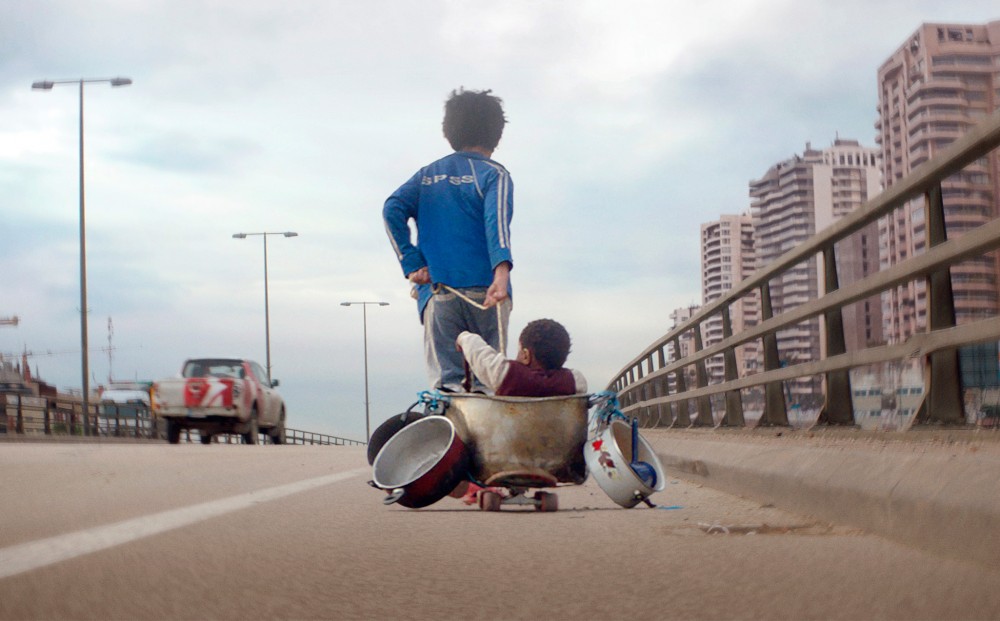
Films that are for adults that revolve around children are becoming more uncommon these days. So much so that people have to differentiate films that are for children with films that are about children. Case in point, the 2004 fantasy drama Bridge to Terabithia. While the film does show a fantasy world and the story does revolve around children, the themes in the story are quite mature and dark, which raises the question: Can children handle dark themes in stories, which are about them?
The reason I bring this up is because the 2019 Lebanese film Capernaum is similar to Bridge to Terabithia, but with a harder edge in terms of its setting and its social-realist themes. And yet, I want parents to bring their children (who can handle the themes) to see Capernaum in the cinema, as it is an incredibly uplifting and heartbreaking experience that is about clinging onto life.
The film starts off in the courtroom, where a hardened, streetwise 12-year-old Lebanese boy, Zain (Zain Al Rafeea) sues his parents in protest of the life they have given him. It is then, where he retraces the incredible journey of this child in search of his identity and who rebels against the life that was imposed on him.
The events that have transpired influence and shape Zain in both positive and negative ways, one of which include meeting up with Rahil (Yordanos Shiferaw), a struggling single mother of one, a toddler by the name of Yonas (Boluwatife Treasure Bankole). And through a sudden change of circumstances, all the lives of three will be changed forever.
In order for the film like this to truly work, the child performances have to be truly genuine and that is no easy feat to get. It can either go bad in two ways, which the first way is that the child would act too much to the camera to the point that they end up annoyingly precocious; or the second way in which the child actor is basically a vessel of the themes of the story and never able to actually portray a human being; a screenwriting construct.
Thankfully, Capernaum features not only just a fantastic performance from its lead actor, Zain al Rafeea, but it is a performance that in my opinion should’ve been nominated for Best Actor at the Oscars. Never falling for those traps mentioned above, Rafeea conveys the anguish, the fear of the unknown and especially the simmering anger of his character with such conviction and emotional intelligence, that it looks effortless. Proving said point, in a recent interview, Rafeea was asked how it was like to act on film, he said “It’s easy. She [Labaki] asks me sometimes to be sad, sometimes to be happy – that’s it.”. In lesser words, Rafeea plays a kid who’s never had a childhood convincingly.
That’s not to say that other actors in the film aren’t given the same spotlight. Yordanos Shiferaw does a great job as Rahil, as she tries to stay vigilant in the hard circumstances of life for herself and her son. And speaking of her toddler son, the way director Labaki was able to get a wonderful performance out of Boluwatife Treasure Bankole (who is a girl), must have required superhuman levels of patience, but it pays off since Bankole is just what she needed to be and not a screenwriting construct, and capably starts a bond with Rafeea that is basically a soothing ointment for all the hardships Zain had gone through.
As to how the film is constructed, the storytelling could have fallen into the trap, in which the film just shows dollops and dollops of misery, in order to make the audience care. Thankfully, director Labaki just (and only just) manages to sidestep that trap by effectively adopting a neo-realistic, visual storytelling approach (along the lines of Francois Truffaut films like The 400 Blows) that offsets the big-hearted sentimentality.
Complimenting the storytelling, Nabaki and cinematographer Christopher Aoun manage to capture the small details of the harsh settings and the characters with clarity, like the ragged clothes, the dilapidated dwellings and especially the grittiness that encompasses both characters and the environments.
It’s a bit of a shame that the storytelling is flawed in other ways. Scenes set in the courtroom can be quite didactic (the gavel isn’t the only hammer used in the courtroom), which goes against the visual storytelling. It also feels quite disarming that since the courtroom scenes start off at the beginning of the film with Zain recounting the events, it does hinder the drama slightly since we know most of the fates of the characters.
But it is an emotional ride in which we see the spiritual journey of how Zain came to be the person he is, and on those terms, Capernaum succeeds mightily; particularly with the life-affirming ending (with that perfect freeze-frame of a final shot), in which the film wears its wholesome heart on its sleeve. And in the current state of the world we live in, we need more films like this, especially for the youth of the world to see.
![]()
![]()
![]()
![]()
![]()
FOUR STARS (OUT OF FIVE)
Capernaum is in cinemas now.
